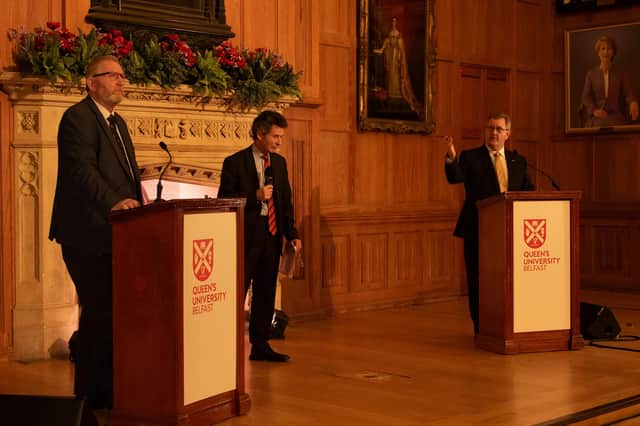Ben Lowry: A realignment within unionism is desirable but there is still no sign of it


The Windsor Framework was not being reopened, so the Irish Sea border was clearly not going to be removed, nor the fact of EU law taking precedence over UK law with regard to a swathe of our economy.
While the DUP’s seven tests were composed sufficiently vaguely to facilitate such failure, albeit prior to the party even walking out of the assembly, it became increasingly clear in recent months that the more sceptical DUP politicians had an understanding of the tests that would not be satisfied.
Advertisement
Hide AdAdvertisement
Hide AdNow Sir Jeffrey Donaldson has led his party to return, to minimal internal opposition. Despite some DUP MLAs being unhappy with events, they are not saying so publicly. The MPs, however, are evenly split (four-four), pro and anti, although the opponents are hardly making trouble. Ian Paisley Junior has mixed his concerns with praise for progress. Sammy Wilson on the other hand is scathing about the deal, but keeping his fire aimed at the “Brexit betraying” government rather than on his party leader (I would say that Brexit has not been abandoned in the way that unionists in Northern Ireland have been).
The DUP peers are more decisively anti the deal than the MPs, including the party chair Lord Morrow. But I think that few grassroots unionists will have much sense of this division. Speeches in the upper house have always got far less attention than speeches in the House of Commons (think of the big parliamentary moments over the last decades, and they are almost always in the far more powerful chamber), and many people don’t even pay attention to the latter.
The Orange Order is clearly not making trouble over the return, and nor the Loyalist Communities Council. Even if a senior member of the DUP resigns from the party, I see no sign of a rupture. Events could hardly have panned out more favourably for Sir Jeffrey.
In his new-found confidence he is talking in the same way that he did in his DUP conference speech, about the need to be positive and win over waverers to the Union. At Westminster he again turned on his unionist critics, but he was careful to maintain the internal DUP civility saying his detractors were “not on these benches but out there in the wider unionism”.
Advertisement
Hide AdAdvertisement
Hide AdHe even adopted a new argument that is being pushed, that the Act of Union is not what we thought: “In our seven tests we talked about fulfilling the Acts of Union while others who hadn’t bothered to read the original Acts of Union, who didn’t know what they were talking about, who seek to rewrite history … talked about restoring something that would mean customs checks on goods moving between Northern Ireland and Great Britain.”
We will soon publish this section of the 1801 Act of Union that lists tariffs that prevailed at the time, but it is a perilous line of reasoning from Sir Jeffrey. No-one thought that the DUP’s position during its long Stormont absence was that the importance of the Act of Union has been overblown and so it is not what unionists thought it was! And in any event, it is undeniable that our place within the Union as a fully integrated part of the UK economy has been gravely damaged.
But there will be time to examine those arguments in coming weeks. Meanwhile, Sir Jeffrey told the BBC that realignment with the Ulster Unionist Party was possible as both parties are on “pretty much the same ground”. He debated Doug Beattie on Thursday night.
I phoned well-informed people in both parties just in case quiet talks were happening, that might lead to a sudden announcement. It isn’t. The UUP feels that the DUP has suddenly moved on to its turf. There is still a lingering resentment of the way in which Sir Jeffrey and Arlene Foster undermined David Trimble for years after the Belfast Agreement while staying in the party. As we report today, Doug Beattie is not keen on pacts.
Advertisement
Hide AdAdvertisement
Hide AdI wondered if one was coming in North Down, for example, to help the UUP candidate Tim Collins but I understand there are fears that the movement of a large part of Lady Sylvia Hermon’s vote to Stephen Farry in Alliance when she retired as MP in 2019 shows how a pact might in fact cause centrist voters to recoil and rally round Alliance.
Even so, I continue to think a realignment is desirable. There is little difference now between the DUP and UUP. A single unionist party will not work, but unionism is not big enough for three parties.
I have always respected moderate unionism that stays strong on the fundamentals of unionism but there is a problem if NI suffers such a monumental change to its position within the UK and there is no sceptical unionist movement.